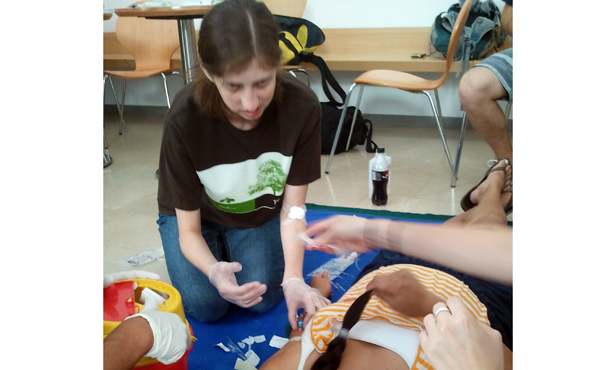Enrolled in the Medical School for International Health (MSIH) in Beer-Sheva, Israel, Bethany Johnson is exactly where she wanted to be after graduating from Eastern Mennonite University (EMU) in 2012 with a degree in biology: well on her way to a career in medical missions.
Johnson traces her interest in practicing medicine overseas all the way back to elementary school in Pennsylvania, where she heard a presentation about the work of Mercy Ships, a nonprofit organization that sends hospital ships to give free medical care in developing countries. Years later, when she began to think about post-undergraduate life, she turned to Google to see what opportunities she could find.
Among those that popped up was the MSIH, a partnership between the Ben-Gurion University of the Negev and the Columbia University Medical Center for training medical students with a special emphasis on global health and preventative medicine.
“What makes our program unique is we take additional courses that focus on having a global perspective,” said Johnson, whose first-year courses largely include traditional medical classes like physiology, microbiology and biochemistry.
While the program follows a North American curriculum and is designed for medical licensure in the U.S. or Canada, all the classes incorporate global health perspective and issues in some way. One distinctive first-year course, with special emphasis on international health, is Clinical and Global Medicine, looking at issues and skills related to cross-cultural healthcare. Johnson and her classmates also study Medical Hebrew during their first two years.
Once she reaches the fourth year of the program, Johnson will have opportunity to do a clinical rotation in several countries in Asia, Africa and South America. Johnson said as of now she’s interested in a rotation in India.
In the meantime, she continues to work at her first-year course load, which was interrupted in unexpected fashion last November by violence between the Israeli military and Hamas militants in the Gaza Strip. On the first day of fighting, sirens went off throughout the night as rockets were fired toward Beer-Sheva. Johnson and a classmate who live together a half-mile from the school stayed inside the whole time, as all students were instructed to do by the school.
After several days of periodic rocket sirens, during which classes at MSIH were cancelled, Johnson caught a train north to calmer areas in Israel. When fighting continued for a week, the school cancelled classes for the remainder of the semester, and Johnson flew home to Pennsylvania on Thanksgiving Day. It gave her an early winter break, but it also meant an early end: she flew back to Israel just before Christmas for a special session of classes and exams to make up for lost time.
In Beer-Sheva, Johnson has also taken advantage of the opportunity to interact with new friends and neighbors who aren’t enrolled as MSIH, and has gotten involved with a Jewish cultural exchange group for American students. Johnson, who went on EMU’s Guatemala-Mexico cross-cultural when she was a student, said being at EMU “definitely helped” prepare her for this new cross-cultural experience, which she plans to extend from the next few years of med school into an entire career of overseas medicine.
At this point, she’s not exactly sure exactly where she’ll end up, or what kind of medical missions she’ll become involved with, but for now, she knows she’s headed in the right direction.
